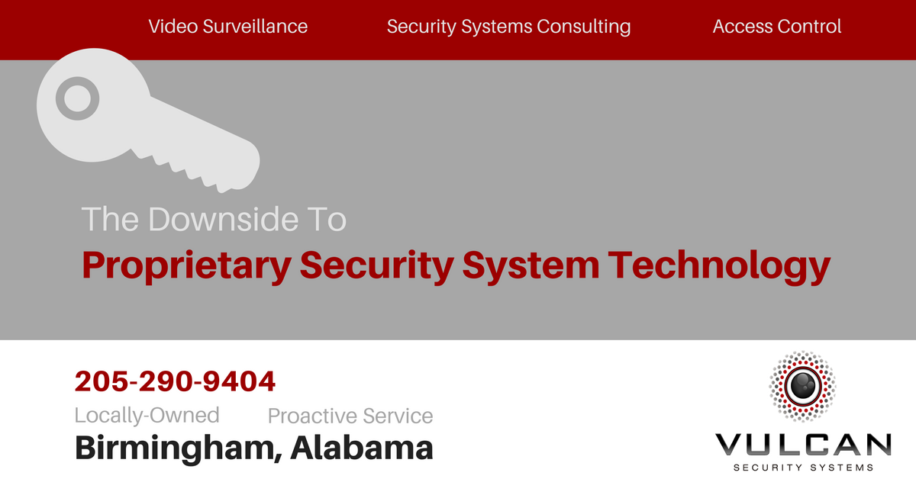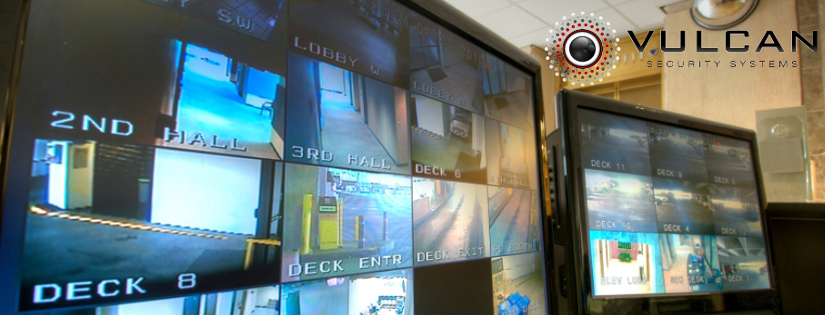We are often called on to consult with clients who are trapped in a proprietary security system that isn’t meeting their needs.
In this post we explain some of the issues related to proprietary technology. We recently helped a client upgrade a system that was costing $1,000 per month with a two-year payback for the new investment:
What Is A Proprietary Security System?
An electronic security system that is used, produced, or marketed under exclusive legal right of the manufacturer is known as proprietary equipment.
Systems like fire alarms, access control, surveillance and burglar alarms can be sold as open systems or proprietary systems, depending on the consultant and provider you work with.
Major national security systems providers typically use proprietary equipment and software. The equipment is typically leased and managed under long term contracts. Service must be performed by authorized representatives and the use of off-the-shelf components or replacement parts is not possible due to contractual requirements and compatibility issues.
Downsides to Propriety Equipment
Proprietary equipment and long term service contracts usually result in the customer being “married” to one particular company and its systems for several years. This limitation opens the door to problems–on the service side for the existing system, for expansion and upgrades, adoption of security innovations, and the integration of separate-but-related technologies.
Maintenance & Repair Issues: Authorized Service Providers Only
Proprietary equipment can usually only be serviced by an authorized representative of the manufacturer and this authorized representative is typically limited to the installation company under the terms of the original installation contract. Replacement parts must be acquired from authorized dealers.
You may have only one authorized service provider in your geographic area.
As long as the authorized service provider takes care of the customer with prompt service and fair pricing then this type of relationship can be successful.
However, in situations where the service provider is slow to respond or won’t respond at all, customer frustrations tend to develop. Unfortunately, there is not much recourse for the customer who is locked into a long term contract involving proprietary equipment.
System Expansions
Depending on the terms of the contract and the components covered in the original contract, a growing and/or evolving company may have trouble expanding or adapting the proprietary OEM system to meet the needs of changing business circumstances except in accordance with the terms of the contract.
For example, if your business campus expands and you need additional control or surveillance units, you probably can’t negotiate a better price for the additional units unless the expansion discount is addressed in the contract.
If you need a technology that’s not offered by your provider, it may be expensive (or impossible, due to intellectual property issues) to add on third-party security technology in an integrated way.
Limited To One Security Ecosystem
Innovations in security system technology occur regularly. Long-term contracts built around the proprietary ecosystem of one original equipment manufacturer can limit your ability to implement new security solutions.
Likewise, you are dependent upon the equipment and software lifecycle of the OEM provider.
To the extent the OEM proprietary provider does implement new technologies, you are limited to the tech direction the company’s engineers and management team choose to go. Remember the VHS vs. Beta distinction of the early 80s in video recording market? If your proprietary provider turns out to be the Betamax technology, you may be stuck for several years using technology that’s on its way out.
You may be forced to upgrade to new equipment because the system updates are not backward compatible with your technology. While the cost of these forced upgrades may be addressed in the contract, you may still experience headaches and even business interruptions that impact your bottom line as an unbudgeted expense.
An Ounce of Prevention
Prevention is probably the best approach to avoid being locked into a single service provider.
Before signing any contract for any type of security system technology, first read the contract carefully and ask the provider if the system is proprietary.
If the equipment is proprietary, you need to ensure that you have more than one service provider in your area who can perform maintenance and upgrades to your system. You do not want to be locked into a long term contract with a single service company.
Vulcan Security Systems has been able to consult with customers experiencing problems with a proprietary system, help them address their current needs, and develop a plan to move on to another service provider when the contract expires.
If we cannot work on a prospective customer’s proprietary equipment, we can typically help the customer find someone that can.
Unless our customer specifically requests a particular proprietary technology, Vulcan Security Systems does not recommend or install proprietary equipment.
Vulcan Security Systems does not require long term contracts or the use of proprietary equipment.
We subscribe to this motto:
If we cannot take care of the customer then we need to help them find someone else who can.
Contact Vulcan Security Systems today for a security needs assessment and system evaluation. We offer free initial consultations to a wide range of businesses across Alabama, from Dothan to Florence and Huntsville and all points in between. We’re locally owned and centrally located in Birmingham, Alabama.
Phone: 205-290-9404
Email: info@vulcansecuritysystems.com

